BS32029: Analyzing P53 Isoforms with KJC12 Antibody Specificity
VerifiedAdded on 2023/06/15
|7
|2103
|436
Report
AI Summary
This workshop report (BS32029) investigates the role of p53 isoforms in cancer prognosis and the specificity of the KJC12 antibody in their expression. The study begins by highlighting the significance of p53 as a tumor suppressor and its complex behavior in cancer cells. Experiments involving transfections of H1299 lung cancer cells, analysis of blood samples from Chronic Lymphocytic Leukemia patients, and studies on colon cancer cells (HCT 116) transfected with siRNA are detailed. Results indicate that KJC12 antibody expresses a wider range of p53 isoforms compared to DO1 antibody, suggesting its crucial role in identifying cancer-specific isoforms. The report concludes that KJC12 antibody can effectively establish the p53 pathway in cancer cells, potentially linking treatment assessment with clinical outcomes, and provides a breakthrough in understanding inconsistencies associated with p53 mutations in cancer treatment. Desklib provides access to this report and other study resources.

Running Header; Lab Report
UNIVERSITY:
NAME :
STUDENT ID:
COURSE CODE
COURSE NAME
ASSIGNMENT
UNIVERSITY:
NAME :
STUDENT ID:
COURSE CODE
COURSE NAME
ASSIGNMENT
Paraphrase This Document
Need a fresh take? Get an instant paraphrase of this document with our AI Paraphraser
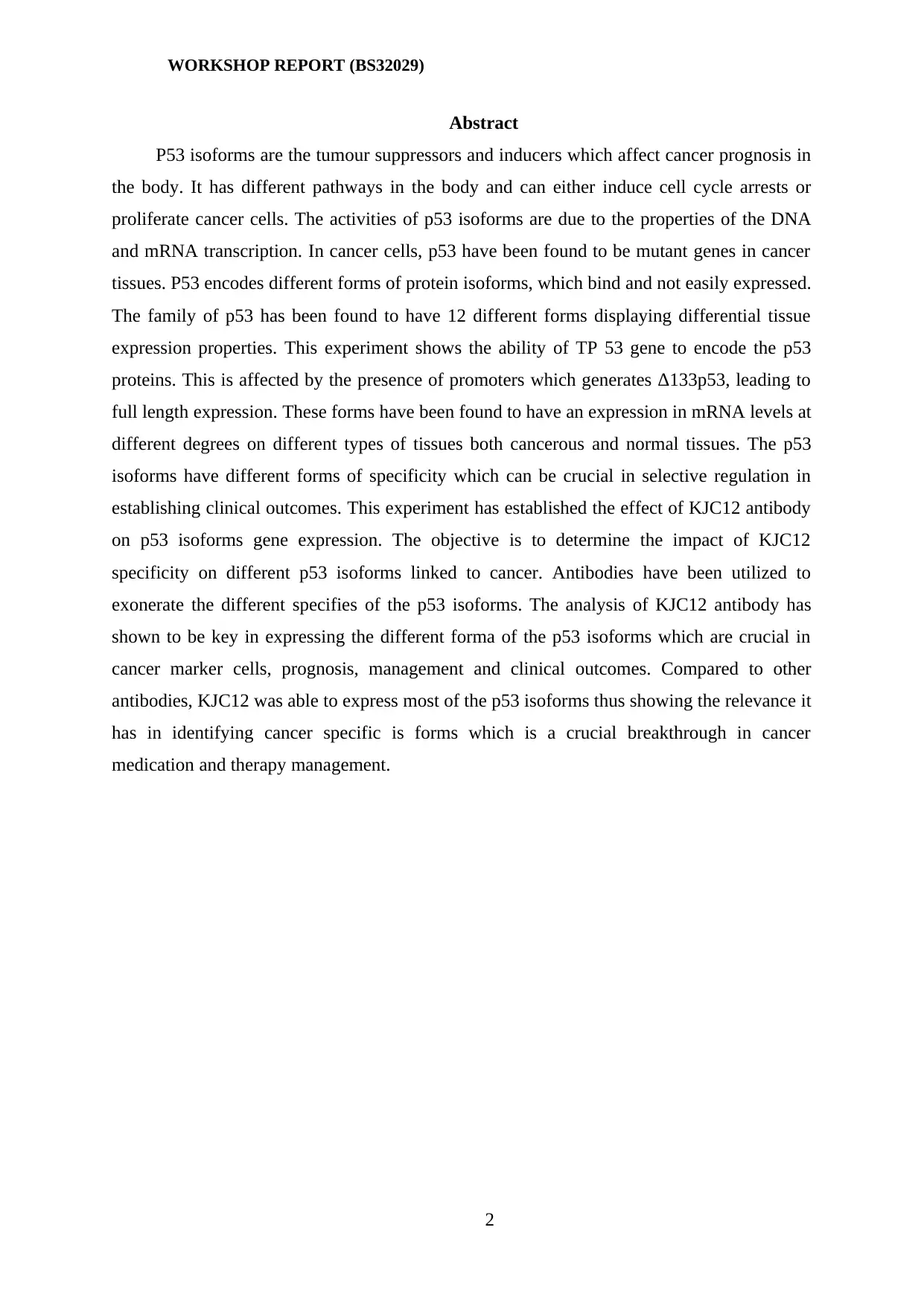
WORKSHOP REPORT (BS32029)
Abstract
P53 isoforms are the tumour suppressors and inducers which affect cancer prognosis in
the body. It has different pathways in the body and can either induce cell cycle arrests or
proliferate cancer cells. The activities of p53 isoforms are due to the properties of the DNA
and mRNA transcription. In cancer cells, p53 have been found to be mutant genes in cancer
tissues. P53 encodes different forms of protein isoforms, which bind and not easily expressed.
The family of p53 has been found to have 12 different forms displaying differential tissue
expression properties. This experiment shows the ability of TP 53 gene to encode the p53
proteins. This is affected by the presence of promoters which generates Δ133p53, leading to
full length expression. These forms have been found to have an expression in mRNA levels at
different degrees on different types of tissues both cancerous and normal tissues. The p53
isoforms have different forms of specificity which can be crucial in selective regulation in
establishing clinical outcomes. This experiment has established the effect of KJC12 antibody
on p53 isoforms gene expression. The objective is to determine the impact of KJC12
specificity on different p53 isoforms linked to cancer. Antibodies have been utilized to
exonerate the different specifies of the p53 isoforms. The analysis of KJC12 antibody has
shown to be key in expressing the different forma of the p53 isoforms which are crucial in
cancer marker cells, prognosis, management and clinical outcomes. Compared to other
antibodies, KJC12 was able to express most of the p53 isoforms thus showing the relevance it
has in identifying cancer specific is forms which is a crucial breakthrough in cancer
medication and therapy management.
2
Abstract
P53 isoforms are the tumour suppressors and inducers which affect cancer prognosis in
the body. It has different pathways in the body and can either induce cell cycle arrests or
proliferate cancer cells. The activities of p53 isoforms are due to the properties of the DNA
and mRNA transcription. In cancer cells, p53 have been found to be mutant genes in cancer
tissues. P53 encodes different forms of protein isoforms, which bind and not easily expressed.
The family of p53 has been found to have 12 different forms displaying differential tissue
expression properties. This experiment shows the ability of TP 53 gene to encode the p53
proteins. This is affected by the presence of promoters which generates Δ133p53, leading to
full length expression. These forms have been found to have an expression in mRNA levels at
different degrees on different types of tissues both cancerous and normal tissues. The p53
isoforms have different forms of specificity which can be crucial in selective regulation in
establishing clinical outcomes. This experiment has established the effect of KJC12 antibody
on p53 isoforms gene expression. The objective is to determine the impact of KJC12
specificity on different p53 isoforms linked to cancer. Antibodies have been utilized to
exonerate the different specifies of the p53 isoforms. The analysis of KJC12 antibody has
shown to be key in expressing the different forma of the p53 isoforms which are crucial in
cancer marker cells, prognosis, management and clinical outcomes. Compared to other
antibodies, KJC12 was able to express most of the p53 isoforms thus showing the relevance it
has in identifying cancer specific is forms which is a crucial breakthrough in cancer
medication and therapy management.
2
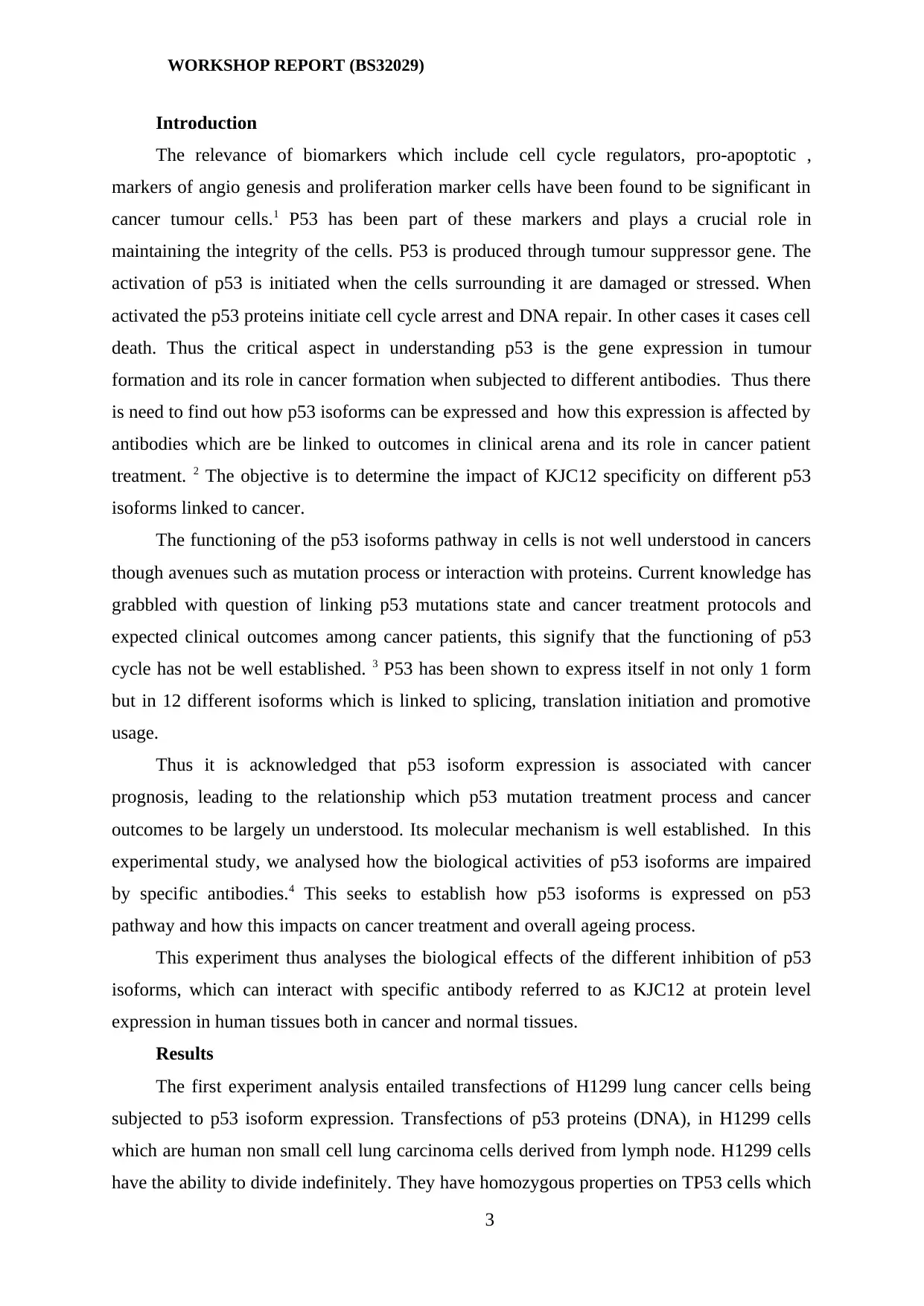
WORKSHOP REPORT (BS32029)
Introduction
The relevance of biomarkers which include cell cycle regulators, pro-apoptotic ,
markers of angio genesis and proliferation marker cells have been found to be significant in
cancer tumour cells.1 P53 has been part of these markers and plays a crucial role in
maintaining the integrity of the cells. P53 is produced through tumour suppressor gene. The
activation of p53 is initiated when the cells surrounding it are damaged or stressed. When
activated the p53 proteins initiate cell cycle arrest and DNA repair. In other cases it cases cell
death. Thus the critical aspect in understanding p53 is the gene expression in tumour
formation and its role in cancer formation when subjected to different antibodies. Thus there
is need to find out how p53 isoforms can be expressed and how this expression is affected by
antibodies which are be linked to outcomes in clinical arena and its role in cancer patient
treatment. 2 The objective is to determine the impact of KJC12 specificity on different p53
isoforms linked to cancer.
The functioning of the p53 isoforms pathway in cells is not well understood in cancers
though avenues such as mutation process or interaction with proteins. Current knowledge has
grabbled with question of linking p53 mutations state and cancer treatment protocols and
expected clinical outcomes among cancer patients, this signify that the functioning of p53
cycle has not be well established. 3 P53 has been shown to express itself in not only 1 form
but in 12 different isoforms which is linked to splicing, translation initiation and promotive
usage.
Thus it is acknowledged that p53 isoform expression is associated with cancer
prognosis, leading to the relationship which p53 mutation treatment process and cancer
outcomes to be largely un understood. Its molecular mechanism is well established. In this
experimental study, we analysed how the biological activities of p53 isoforms are impaired
by specific antibodies.4 This seeks to establish how p53 isoforms is expressed on p53
pathway and how this impacts on cancer treatment and overall ageing process.
This experiment thus analyses the biological effects of the different inhibition of p53
isoforms, which can interact with specific antibody referred to as KJC12 at protein level
expression in human tissues both in cancer and normal tissues.
Results
The first experiment analysis entailed transfections of H1299 lung cancer cells being
subjected to p53 isoform expression. Transfections of p53 proteins (DNA), in H1299 cells
which are human non small cell lung carcinoma cells derived from lymph node. H1299 cells
have the ability to divide indefinitely. They have homozygous properties on TP53 cells which
3
Introduction
The relevance of biomarkers which include cell cycle regulators, pro-apoptotic ,
markers of angio genesis and proliferation marker cells have been found to be significant in
cancer tumour cells.1 P53 has been part of these markers and plays a crucial role in
maintaining the integrity of the cells. P53 is produced through tumour suppressor gene. The
activation of p53 is initiated when the cells surrounding it are damaged or stressed. When
activated the p53 proteins initiate cell cycle arrest and DNA repair. In other cases it cases cell
death. Thus the critical aspect in understanding p53 is the gene expression in tumour
formation and its role in cancer formation when subjected to different antibodies. Thus there
is need to find out how p53 isoforms can be expressed and how this expression is affected by
antibodies which are be linked to outcomes in clinical arena and its role in cancer patient
treatment. 2 The objective is to determine the impact of KJC12 specificity on different p53
isoforms linked to cancer.
The functioning of the p53 isoforms pathway in cells is not well understood in cancers
though avenues such as mutation process or interaction with proteins. Current knowledge has
grabbled with question of linking p53 mutations state and cancer treatment protocols and
expected clinical outcomes among cancer patients, this signify that the functioning of p53
cycle has not be well established. 3 P53 has been shown to express itself in not only 1 form
but in 12 different isoforms which is linked to splicing, translation initiation and promotive
usage.
Thus it is acknowledged that p53 isoform expression is associated with cancer
prognosis, leading to the relationship which p53 mutation treatment process and cancer
outcomes to be largely un understood. Its molecular mechanism is well established. In this
experimental study, we analysed how the biological activities of p53 isoforms are impaired
by specific antibodies.4 This seeks to establish how p53 isoforms is expressed on p53
pathway and how this impacts on cancer treatment and overall ageing process.
This experiment thus analyses the biological effects of the different inhibition of p53
isoforms, which can interact with specific antibody referred to as KJC12 at protein level
expression in human tissues both in cancer and normal tissues.
Results
The first experiment analysis entailed transfections of H1299 lung cancer cells being
subjected to p53 isoform expression. Transfections of p53 proteins (DNA), in H1299 cells
which are human non small cell lung carcinoma cells derived from lymph node. H1299 cells
have the ability to divide indefinitely. They have homozygous properties on TP53 cells which
3
⊘ This is a preview!⊘
Do you want full access?
Subscribe today to unlock all pages.

Trusted by 1+ million students worldwide
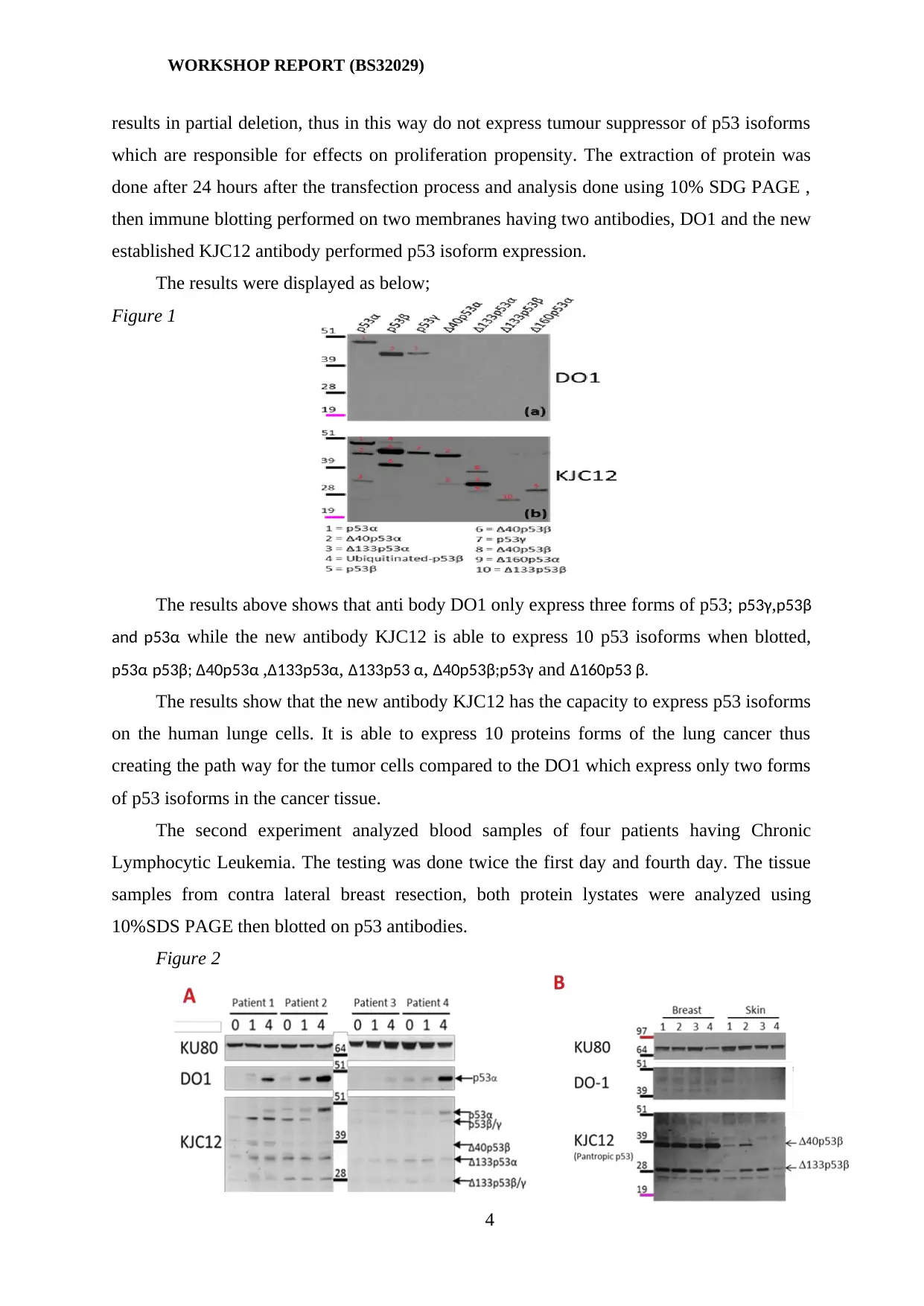
WORKSHOP REPORT (BS32029)
results in partial deletion, thus in this way do not express tumour suppressor of p53 isoforms
which are responsible for effects on proliferation propensity. The extraction of protein was
done after 24 hours after the transfection process and analysis done using 10% SDG PAGE ,
then immune blotting performed on two membranes having two antibodies, DO1 and the new
established KJC12 antibody performed p53 isoform expression.
The results were displayed as below;
Figure 1
The results above shows that anti body DO1 only express three forms of p53; p53γ,p53β
and p53α while the new antibody KJC12 is able to express 10 p53 isoforms when blotted,
p53α p53β; Δ40p53α ,Δ133p53α, Δ133p53 α, Δ40p53β;p53γ and Δ160p53 β.
The results show that the new antibody KJC12 has the capacity to express p53 isoforms
on the human lunge cells. It is able to express 10 proteins forms of the lung cancer thus
creating the path way for the tumor cells compared to the DO1 which express only two forms
of p53 isoforms in the cancer tissue.
The second experiment analyzed blood samples of four patients having Chronic
Lymphocytic Leukemia. The testing was done twice the first day and fourth day. The tissue
samples from contra lateral breast resection, both protein lystates were analyzed using
10%SDS PAGE then blotted on p53 antibodies.
Figure 2
4
results in partial deletion, thus in this way do not express tumour suppressor of p53 isoforms
which are responsible for effects on proliferation propensity. The extraction of protein was
done after 24 hours after the transfection process and analysis done using 10% SDG PAGE ,
then immune blotting performed on two membranes having two antibodies, DO1 and the new
established KJC12 antibody performed p53 isoform expression.
The results were displayed as below;
Figure 1
The results above shows that anti body DO1 only express three forms of p53; p53γ,p53β
and p53α while the new antibody KJC12 is able to express 10 p53 isoforms when blotted,
p53α p53β; Δ40p53α ,Δ133p53α, Δ133p53 α, Δ40p53β;p53γ and Δ160p53 β.
The results show that the new antibody KJC12 has the capacity to express p53 isoforms
on the human lunge cells. It is able to express 10 proteins forms of the lung cancer thus
creating the path way for the tumor cells compared to the DO1 which express only two forms
of p53 isoforms in the cancer tissue.
The second experiment analyzed blood samples of four patients having Chronic
Lymphocytic Leukemia. The testing was done twice the first day and fourth day. The tissue
samples from contra lateral breast resection, both protein lystates were analyzed using
10%SDS PAGE then blotted on p53 antibodies.
Figure 2
4
Paraphrase This Document
Need a fresh take? Get an instant paraphrase of this document with our AI Paraphraser
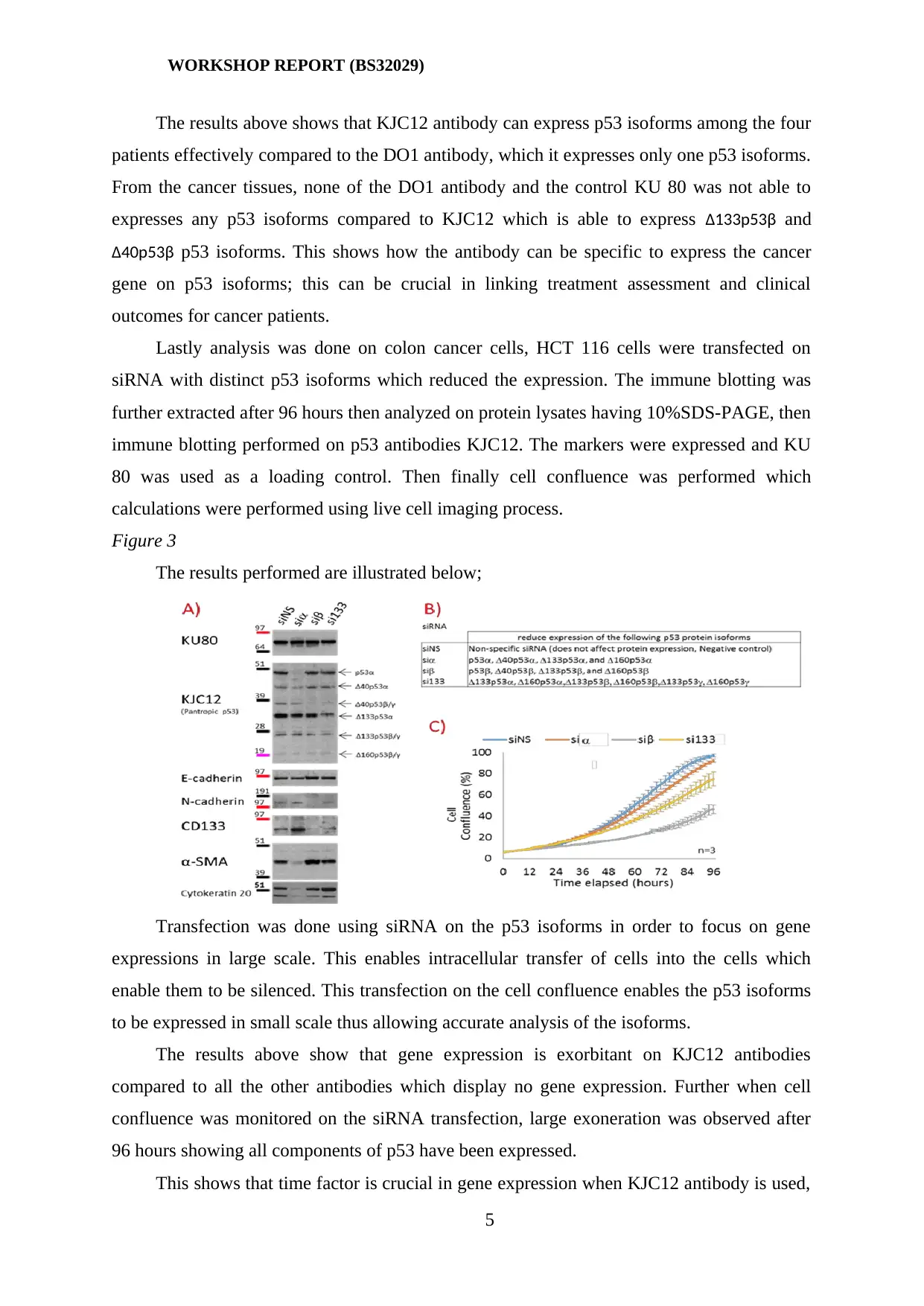
WORKSHOP REPORT (BS32029)
The results above shows that KJC12 antibody can express p53 isoforms among the four
patients effectively compared to the DO1 antibody, which it expresses only one p53 isoforms.
From the cancer tissues, none of the DO1 antibody and the control KU 80 was not able to
expresses any p53 isoforms compared to KJC12 which is able to express Δ133p53β and
Δ40p53β p53 isoforms. This shows how the antibody can be specific to express the cancer
gene on p53 isoforms; this can be crucial in linking treatment assessment and clinical
outcomes for cancer patients.
Lastly analysis was done on colon cancer cells, HCT 116 cells were transfected on
siRNA with distinct p53 isoforms which reduced the expression. The immune blotting was
further extracted after 96 hours then analyzed on protein lysates having 10%SDS-PAGE, then
immune blotting performed on p53 antibodies KJC12. The markers were expressed and KU
80 was used as a loading control. Then finally cell confluence was performed which
calculations were performed using live cell imaging process.
Figure 3
The results performed are illustrated below;
Transfection was done using siRNA on the p53 isoforms in order to focus on gene
expressions in large scale. This enables intracellular transfer of cells into the cells which
enable them to be silenced. This transfection on the cell confluence enables the p53 isoforms
to be expressed in small scale thus allowing accurate analysis of the isoforms.
The results above show that gene expression is exorbitant on KJC12 antibodies
compared to all the other antibodies which display no gene expression. Further when cell
confluence was monitored on the siRNA transfection, large exoneration was observed after
96 hours showing all components of p53 have been expressed.
This shows that time factor is crucial in gene expression when KJC12 antibody is used,
5
The results above shows that KJC12 antibody can express p53 isoforms among the four
patients effectively compared to the DO1 antibody, which it expresses only one p53 isoforms.
From the cancer tissues, none of the DO1 antibody and the control KU 80 was not able to
expresses any p53 isoforms compared to KJC12 which is able to express Δ133p53β and
Δ40p53β p53 isoforms. This shows how the antibody can be specific to express the cancer
gene on p53 isoforms; this can be crucial in linking treatment assessment and clinical
outcomes for cancer patients.
Lastly analysis was done on colon cancer cells, HCT 116 cells were transfected on
siRNA with distinct p53 isoforms which reduced the expression. The immune blotting was
further extracted after 96 hours then analyzed on protein lysates having 10%SDS-PAGE, then
immune blotting performed on p53 antibodies KJC12. The markers were expressed and KU
80 was used as a loading control. Then finally cell confluence was performed which
calculations were performed using live cell imaging process.
Figure 3
The results performed are illustrated below;
Transfection was done using siRNA on the p53 isoforms in order to focus on gene
expressions in large scale. This enables intracellular transfer of cells into the cells which
enable them to be silenced. This transfection on the cell confluence enables the p53 isoforms
to be expressed in small scale thus allowing accurate analysis of the isoforms.
The results above show that gene expression is exorbitant on KJC12 antibodies
compared to all the other antibodies which display no gene expression. Further when cell
confluence was monitored on the siRNA transfection, large exoneration was observed after
96 hours showing all components of p53 have been expressed.
This shows that time factor is crucial in gene expression when KJC12 antibody is used,
5
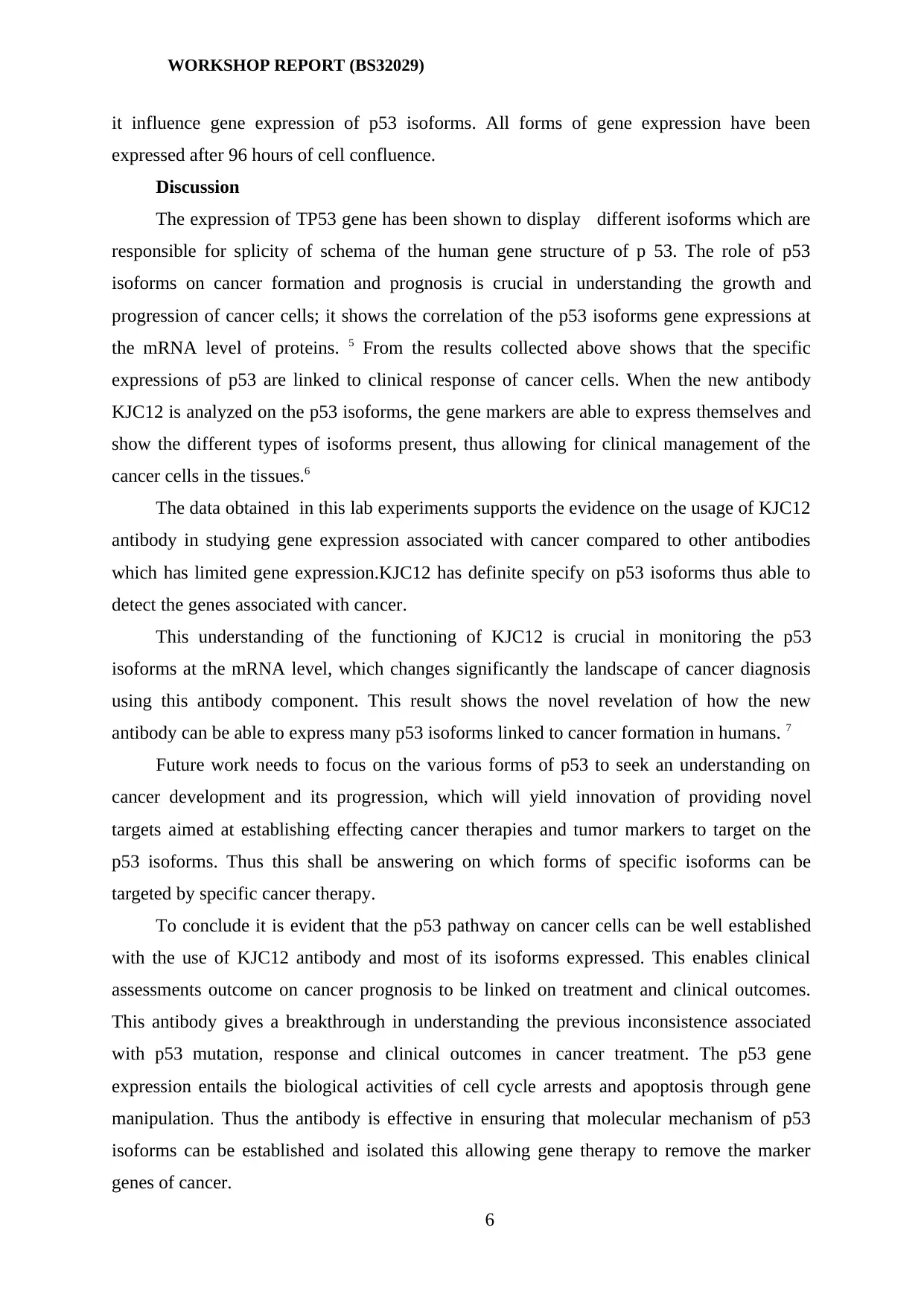
WORKSHOP REPORT (BS32029)
it influence gene expression of p53 isoforms. All forms of gene expression have been
expressed after 96 hours of cell confluence.
Discussion
The expression of TP53 gene has been shown to display different isoforms which are
responsible for splicity of schema of the human gene structure of p 53. The role of p53
isoforms on cancer formation and prognosis is crucial in understanding the growth and
progression of cancer cells; it shows the correlation of the p53 isoforms gene expressions at
the mRNA level of proteins. 5 From the results collected above shows that the specific
expressions of p53 are linked to clinical response of cancer cells. When the new antibody
KJC12 is analyzed on the p53 isoforms, the gene markers are able to express themselves and
show the different types of isoforms present, thus allowing for clinical management of the
cancer cells in the tissues.6
The data obtained in this lab experiments supports the evidence on the usage of KJC12
antibody in studying gene expression associated with cancer compared to other antibodies
which has limited gene expression.KJC12 has definite specify on p53 isoforms thus able to
detect the genes associated with cancer.
This understanding of the functioning of KJC12 is crucial in monitoring the p53
isoforms at the mRNA level, which changes significantly the landscape of cancer diagnosis
using this antibody component. This result shows the novel revelation of how the new
antibody can be able to express many p53 isoforms linked to cancer formation in humans. 7
Future work needs to focus on the various forms of p53 to seek an understanding on
cancer development and its progression, which will yield innovation of providing novel
targets aimed at establishing effecting cancer therapies and tumor markers to target on the
p53 isoforms. Thus this shall be answering on which forms of specific isoforms can be
targeted by specific cancer therapy.
To conclude it is evident that the p53 pathway on cancer cells can be well established
with the use of KJC12 antibody and most of its isoforms expressed. This enables clinical
assessments outcome on cancer prognosis to be linked on treatment and clinical outcomes.
This antibody gives a breakthrough in understanding the previous inconsistence associated
with p53 mutation, response and clinical outcomes in cancer treatment. The p53 gene
expression entails the biological activities of cell cycle arrests and apoptosis through gene
manipulation. Thus the antibody is effective in ensuring that molecular mechanism of p53
isoforms can be established and isolated this allowing gene therapy to remove the marker
genes of cancer.
6
it influence gene expression of p53 isoforms. All forms of gene expression have been
expressed after 96 hours of cell confluence.
Discussion
The expression of TP53 gene has been shown to display different isoforms which are
responsible for splicity of schema of the human gene structure of p 53. The role of p53
isoforms on cancer formation and prognosis is crucial in understanding the growth and
progression of cancer cells; it shows the correlation of the p53 isoforms gene expressions at
the mRNA level of proteins. 5 From the results collected above shows that the specific
expressions of p53 are linked to clinical response of cancer cells. When the new antibody
KJC12 is analyzed on the p53 isoforms, the gene markers are able to express themselves and
show the different types of isoforms present, thus allowing for clinical management of the
cancer cells in the tissues.6
The data obtained in this lab experiments supports the evidence on the usage of KJC12
antibody in studying gene expression associated with cancer compared to other antibodies
which has limited gene expression.KJC12 has definite specify on p53 isoforms thus able to
detect the genes associated with cancer.
This understanding of the functioning of KJC12 is crucial in monitoring the p53
isoforms at the mRNA level, which changes significantly the landscape of cancer diagnosis
using this antibody component. This result shows the novel revelation of how the new
antibody can be able to express many p53 isoforms linked to cancer formation in humans. 7
Future work needs to focus on the various forms of p53 to seek an understanding on
cancer development and its progression, which will yield innovation of providing novel
targets aimed at establishing effecting cancer therapies and tumor markers to target on the
p53 isoforms. Thus this shall be answering on which forms of specific isoforms can be
targeted by specific cancer therapy.
To conclude it is evident that the p53 pathway on cancer cells can be well established
with the use of KJC12 antibody and most of its isoforms expressed. This enables clinical
assessments outcome on cancer prognosis to be linked on treatment and clinical outcomes.
This antibody gives a breakthrough in understanding the previous inconsistence associated
with p53 mutation, response and clinical outcomes in cancer treatment. The p53 gene
expression entails the biological activities of cell cycle arrests and apoptosis through gene
manipulation. Thus the antibody is effective in ensuring that molecular mechanism of p53
isoforms can be established and isolated this allowing gene therapy to remove the marker
genes of cancer.
6
⊘ This is a preview!⊘
Do you want full access?
Subscribe today to unlock all pages.

Trusted by 1+ million students worldwide
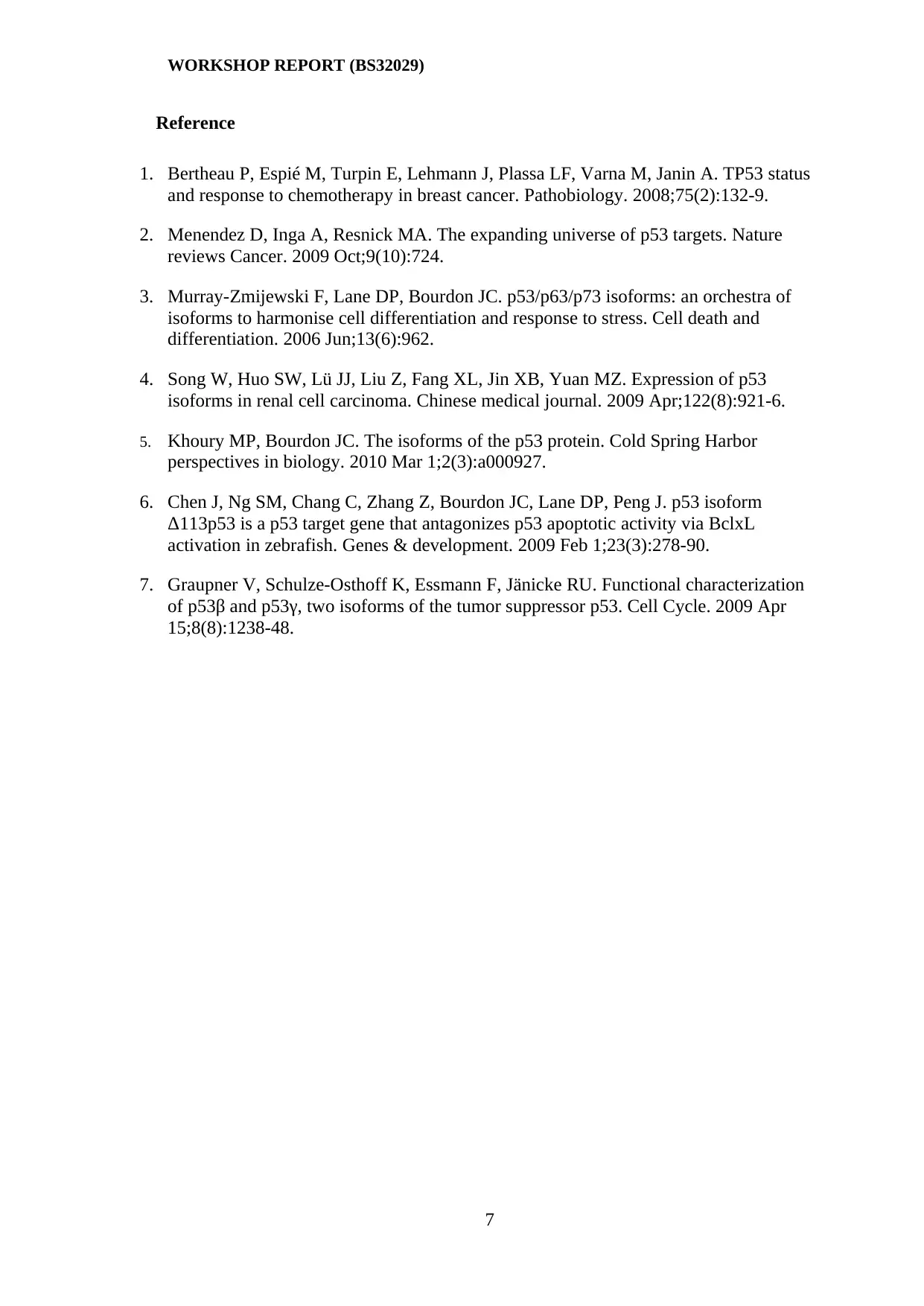
WORKSHOP REPORT (BS32029)
Reference
1. Bertheau P, Espié M, Turpin E, Lehmann J, Plassa LF, Varna M, Janin A. TP53 status
and response to chemotherapy in breast cancer. Pathobiology. 2008;75(2):132-9.
2. Menendez D, Inga A, Resnick MA. The expanding universe of p53 targets. Nature
reviews Cancer. 2009 Oct;9(10):724.
3. Murray-Zmijewski F, Lane DP, Bourdon JC. p53/p63/p73 isoforms: an orchestra of
isoforms to harmonise cell differentiation and response to stress. Cell death and
differentiation. 2006 Jun;13(6):962.
4. Song W, Huo SW, Lü JJ, Liu Z, Fang XL, Jin XB, Yuan MZ. Expression of p53
isoforms in renal cell carcinoma. Chinese medical journal. 2009 Apr;122(8):921-6.
5. Khoury MP, Bourdon JC. The isoforms of the p53 protein. Cold Spring Harbor
perspectives in biology. 2010 Mar 1;2(3):a000927.
6. Chen J, Ng SM, Chang C, Zhang Z, Bourdon JC, Lane DP, Peng J. p53 isoform
Δ113p53 is a p53 target gene that antagonizes p53 apoptotic activity via BclxL
activation in zebrafish. Genes & development. 2009 Feb 1;23(3):278-90.
7. Graupner V, Schulze-Osthoff K, Essmann F, Jänicke RU. Functional characterization
of p53β and p53γ, two isoforms of the tumor suppressor p53. Cell Cycle. 2009 Apr
15;8(8):1238-48.
7
Reference
1. Bertheau P, Espié M, Turpin E, Lehmann J, Plassa LF, Varna M, Janin A. TP53 status
and response to chemotherapy in breast cancer. Pathobiology. 2008;75(2):132-9.
2. Menendez D, Inga A, Resnick MA. The expanding universe of p53 targets. Nature
reviews Cancer. 2009 Oct;9(10):724.
3. Murray-Zmijewski F, Lane DP, Bourdon JC. p53/p63/p73 isoforms: an orchestra of
isoforms to harmonise cell differentiation and response to stress. Cell death and
differentiation. 2006 Jun;13(6):962.
4. Song W, Huo SW, Lü JJ, Liu Z, Fang XL, Jin XB, Yuan MZ. Expression of p53
isoforms in renal cell carcinoma. Chinese medical journal. 2009 Apr;122(8):921-6.
5. Khoury MP, Bourdon JC. The isoforms of the p53 protein. Cold Spring Harbor
perspectives in biology. 2010 Mar 1;2(3):a000927.
6. Chen J, Ng SM, Chang C, Zhang Z, Bourdon JC, Lane DP, Peng J. p53 isoform
Δ113p53 is a p53 target gene that antagonizes p53 apoptotic activity via BclxL
activation in zebrafish. Genes & development. 2009 Feb 1;23(3):278-90.
7. Graupner V, Schulze-Osthoff K, Essmann F, Jänicke RU. Functional characterization
of p53β and p53γ, two isoforms of the tumor suppressor p53. Cell Cycle. 2009 Apr
15;8(8):1238-48.
7
1 out of 7
Related Documents
Your All-in-One AI-Powered Toolkit for Academic Success.
+13062052269
info@desklib.com
Available 24*7 on WhatsApp / Email
![[object Object]](/_next/static/media/star-bottom.7253800d.svg)
Unlock your academic potential
Copyright © 2020–2025 A2Z Services. All Rights Reserved. Developed and managed by ZUCOL.





